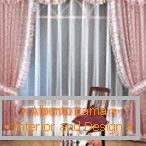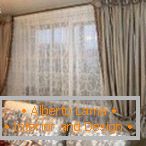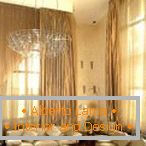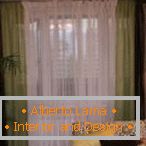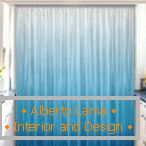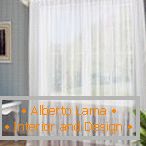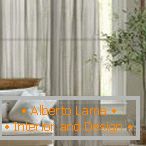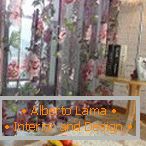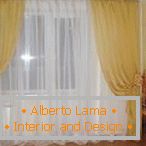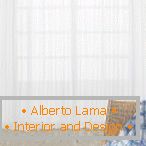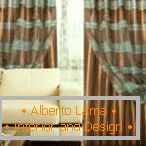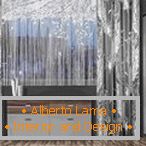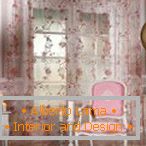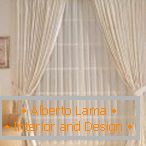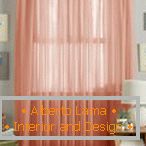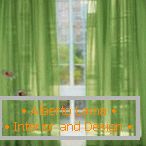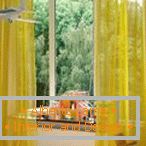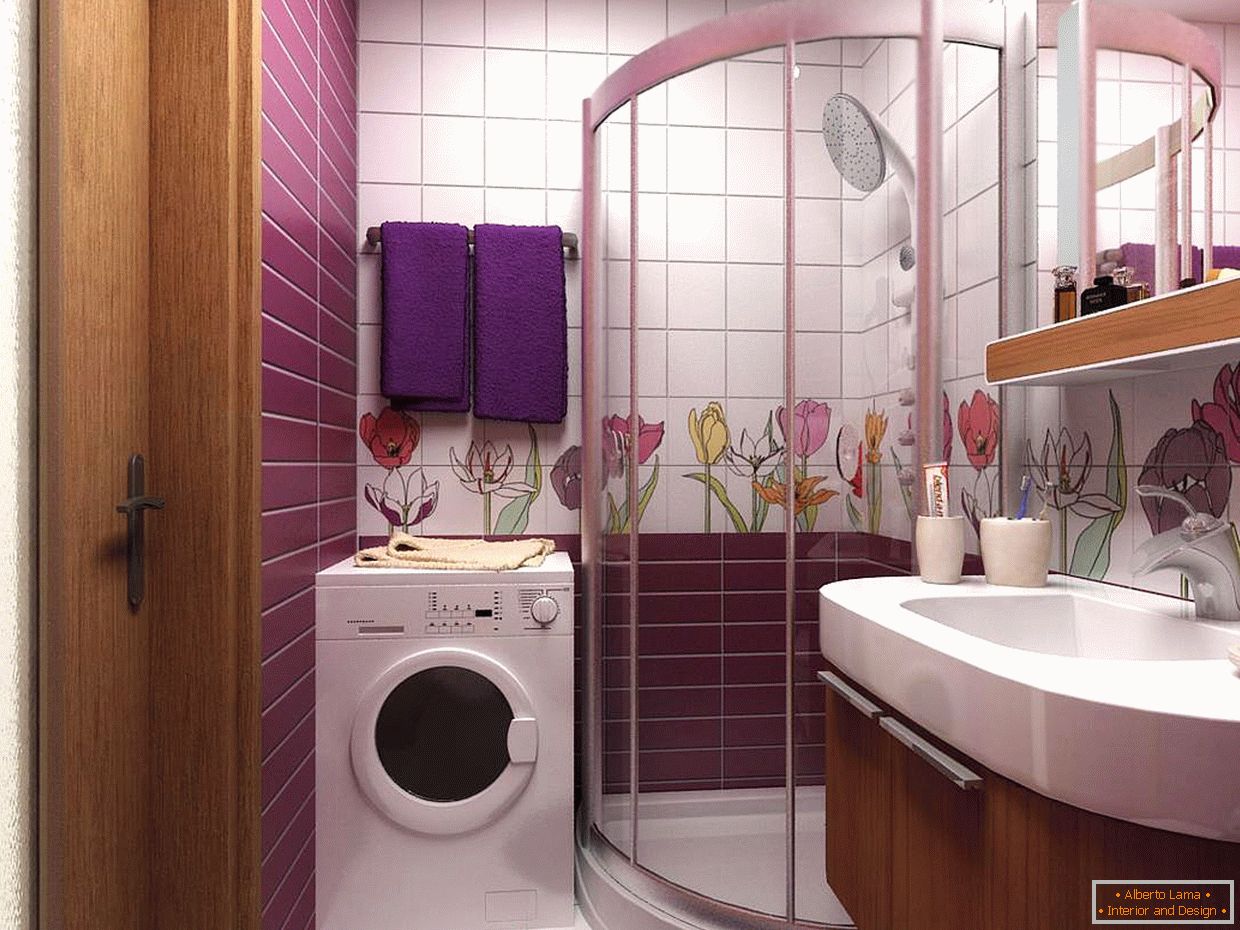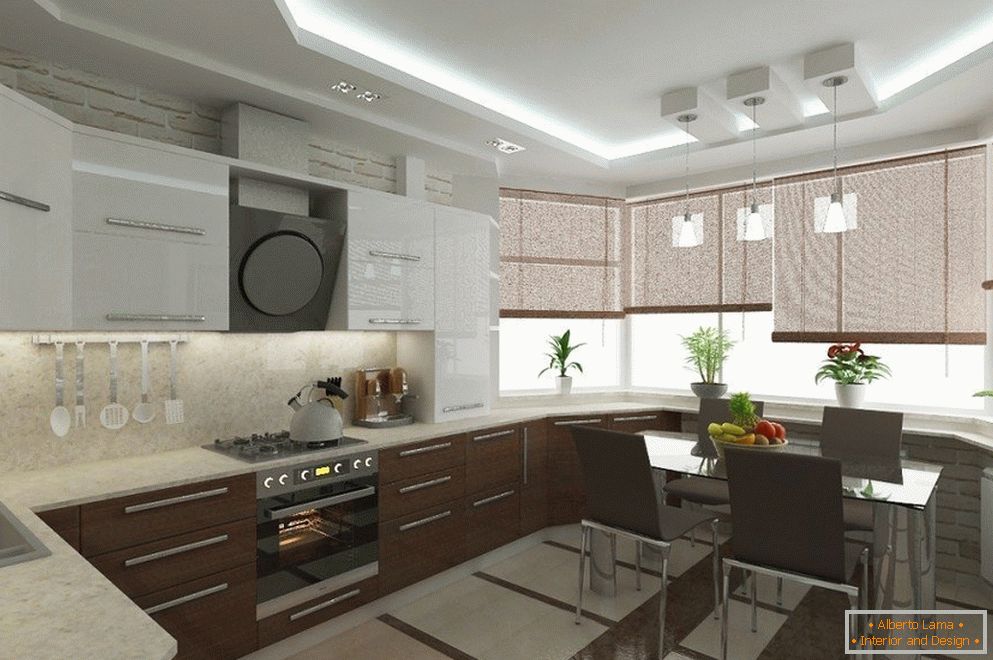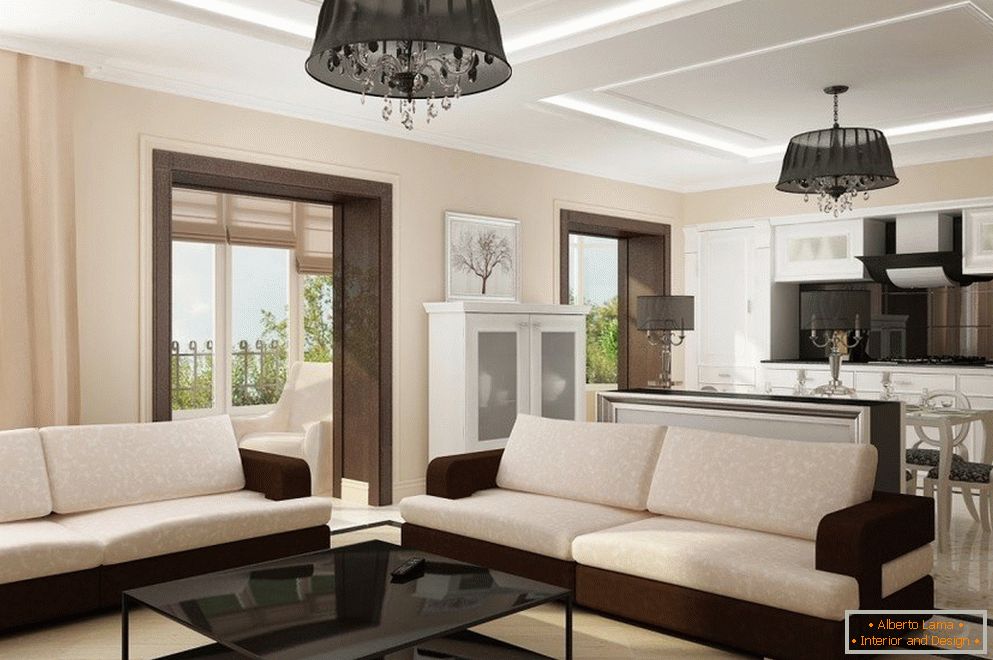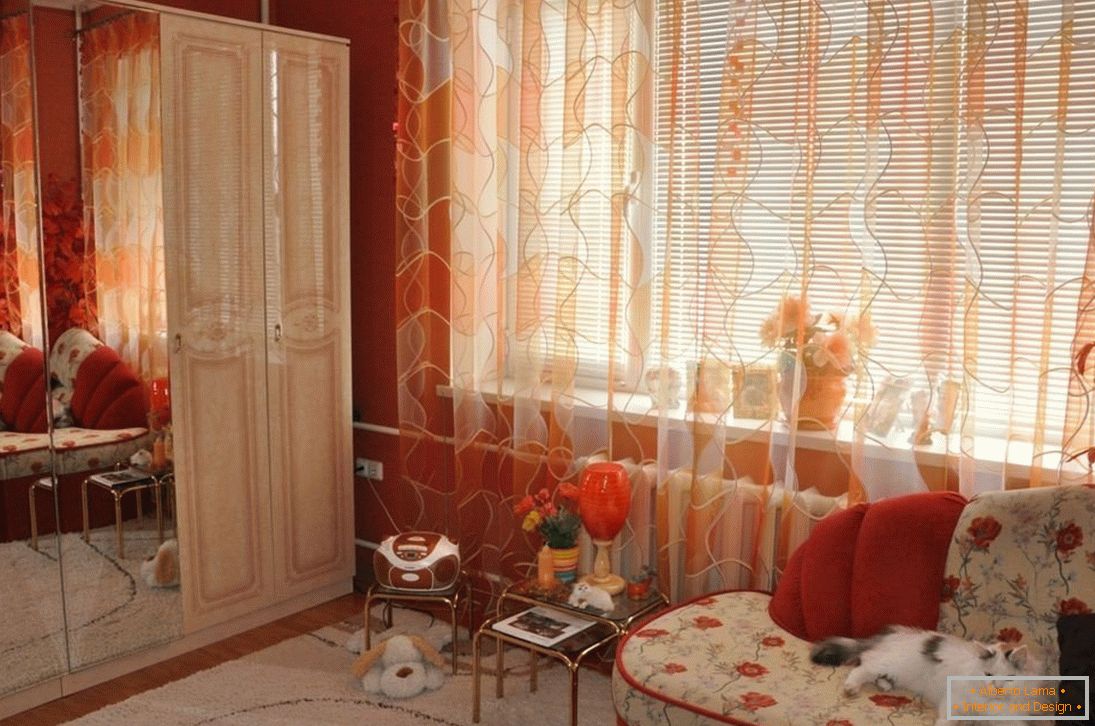
Regardless of the housing situation, tulle in the interior plays an important role. This light curtain made of transparent or translucent fabric gives a harmonious appearance to the room, complements curtains and furniture, dissipates sunlight penetrating from the outside. In addition, with open windows, it serves as a barrier to insects. Quality tulle retains a decent appearance for at least 5-7 years.
It is important that the tulle shade be one or two shades lighter than the curtains. Otherwise, the room will look poorly lit, gloomy and not well-groomed.
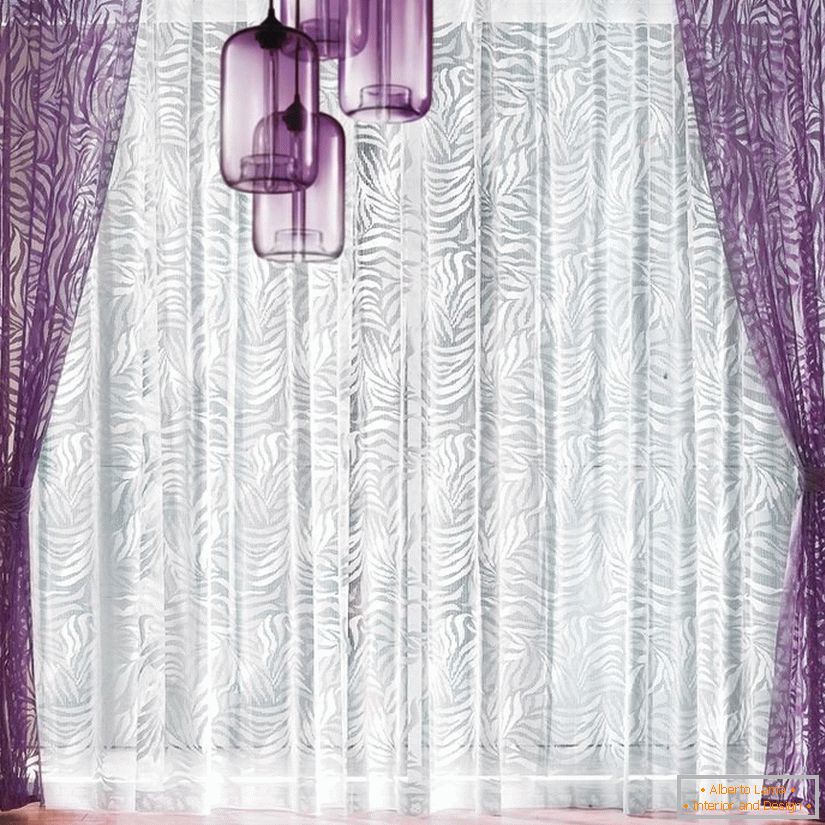
Materials
For sewing curtains use thin, letting air and sunlight fabrics. The most common are:
- organza;
- veil;
- sour;
- grid.
Organza is a strong, practically transparent cloth. It is produced by dense twisting of filaments of the same thickness. The advantage of this material is that it practically does not accumulate dust. It is made of silk or synthetic yarn. One of the most universal is the veil curtains. Produce this fabric from natural or artificial materials: cotton, silk, wool, polyester. It is softer and tender than the organza, but less transparent. Kisei is a light, transparent cotton fabric from separately located threads. It does not require complex care, it does not crumble, cleaning at home is acceptable. The grid is distinguished by a special, perforated structure. Such a curtain well passes air and sunlight, but quickly accumulates dust and requires more frequent, compared with other tissues, washing. It is often made with embroidery silk threads, which looks original and effective, fastens rhinestones or sequins.
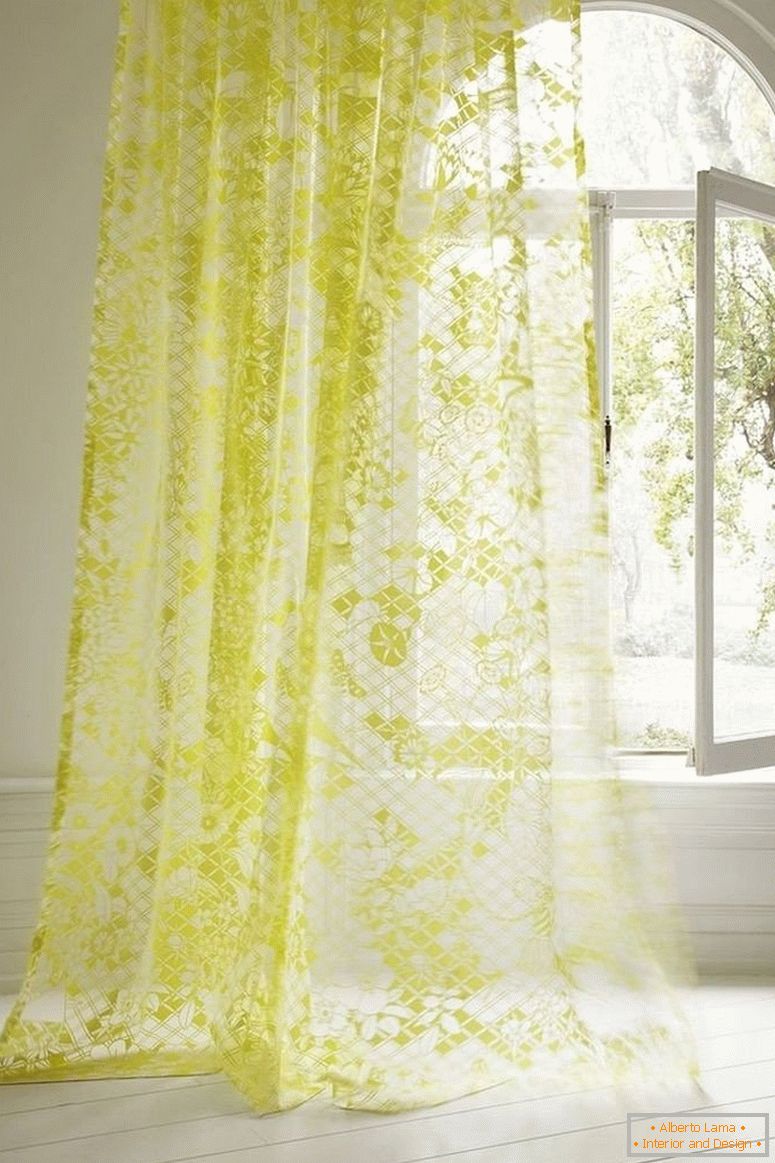
Types of weaving
For the production of tulle we use fabrics of various types, the most popular of which are cambric, chiffon and jacquard. Baptiste is a gentle, smooth fabric of thin, tightly twisted fibers. From it, often make a tulle with embroidery. Curtains made of chiffon are characterized by a relief structure, well suited to drape. They allow a complex cut, multilayeredness, the presence of decorative elements: volumetric colors, bows, ribbons.
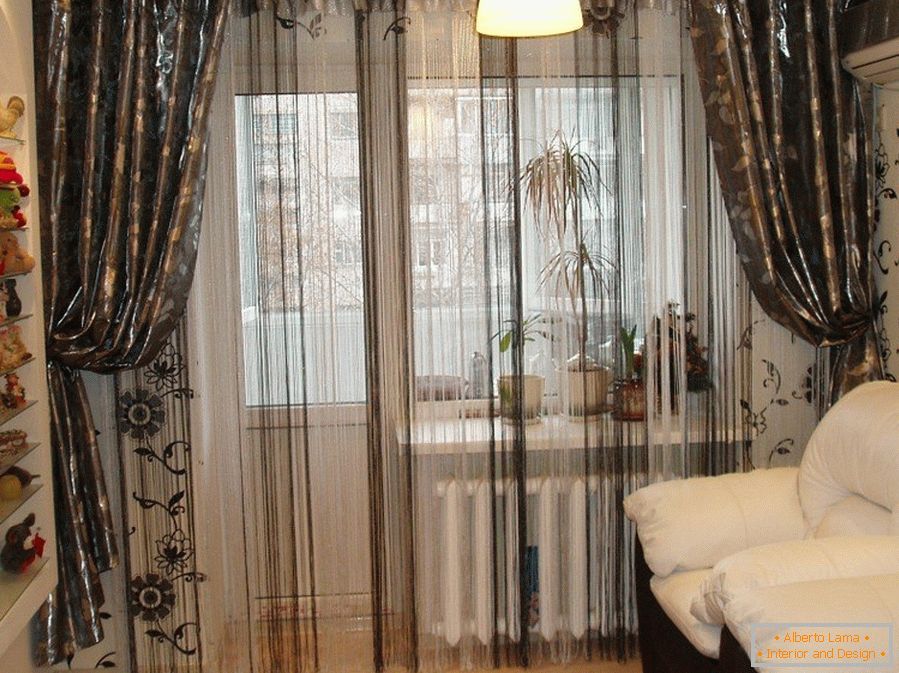
Jacquard is a sturdy embossed fabric made of threads of different color and thickness. This tulle is resistant to deformation, looks noble, does not require specific care, looks good in daylight and artificial light. It can become an effective piece of the interior, especially in combination with monochrome curtains without noticeable, large patterns.
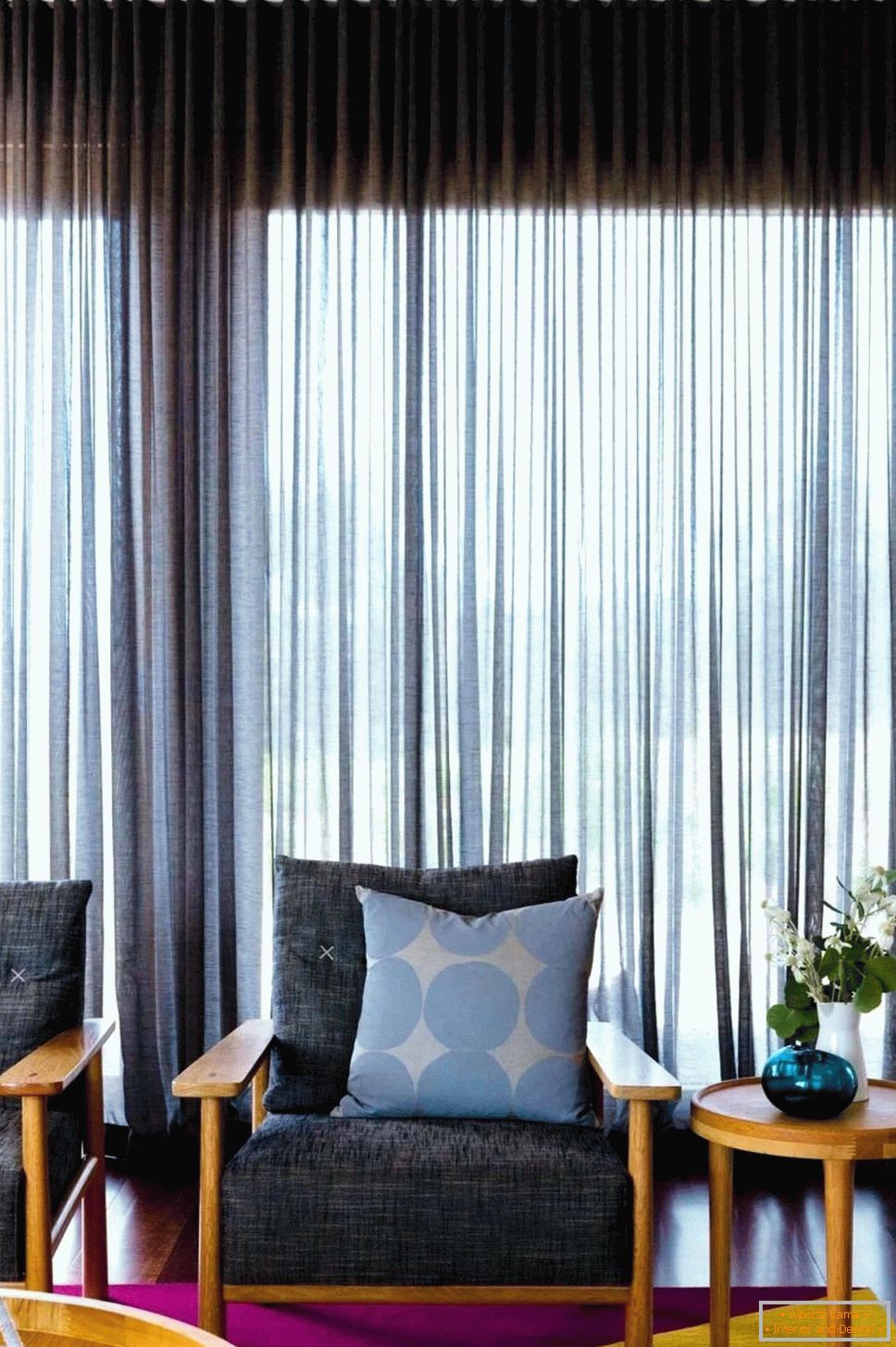
Colors
The traditional color of the curtains is white. This is due to the following reasons:
- snow-white tulle looks light and airy, with it any room gives the impression of well-lit and spacious;
- this color is combined with a variety of shades in the interior - cold and warm, light and dark, bright and muted;
- such a fabric best passes light.
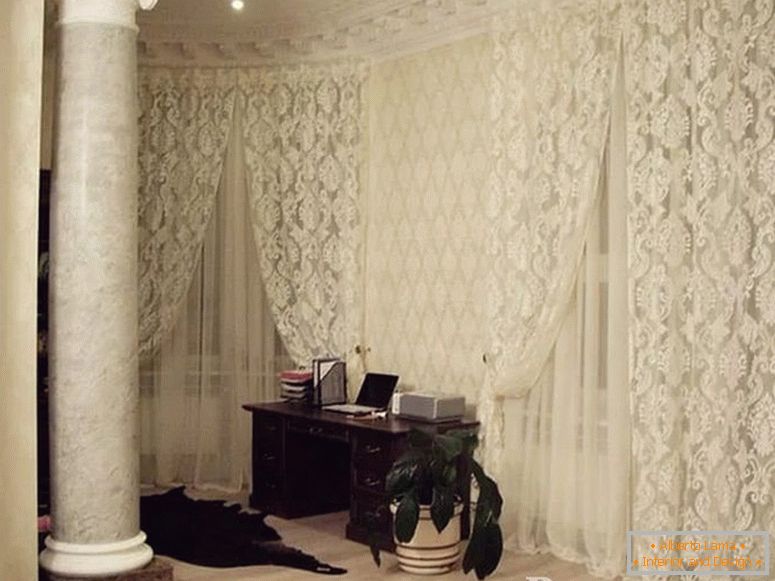
Despite the versatility of white, modern designers offer a variety of options for the coloring of curtains, from restrained to bright. Invariably popular is light beige, golden, mint, silvery, peach, cream tulle. Very impressive looks lemon, lime or lavender. It fits particularly well with the interior of the living room or the nursery.
Yellow curtains of any shades are combined with blue, green, milky-white curtains. Blue in the interior of the bedroom will help to relax after a day's work, looks good with curtains of blue, lilac, gray. White in the interior of the living room, combined with white curtains, will help visually expand the space, make the room more spacious.
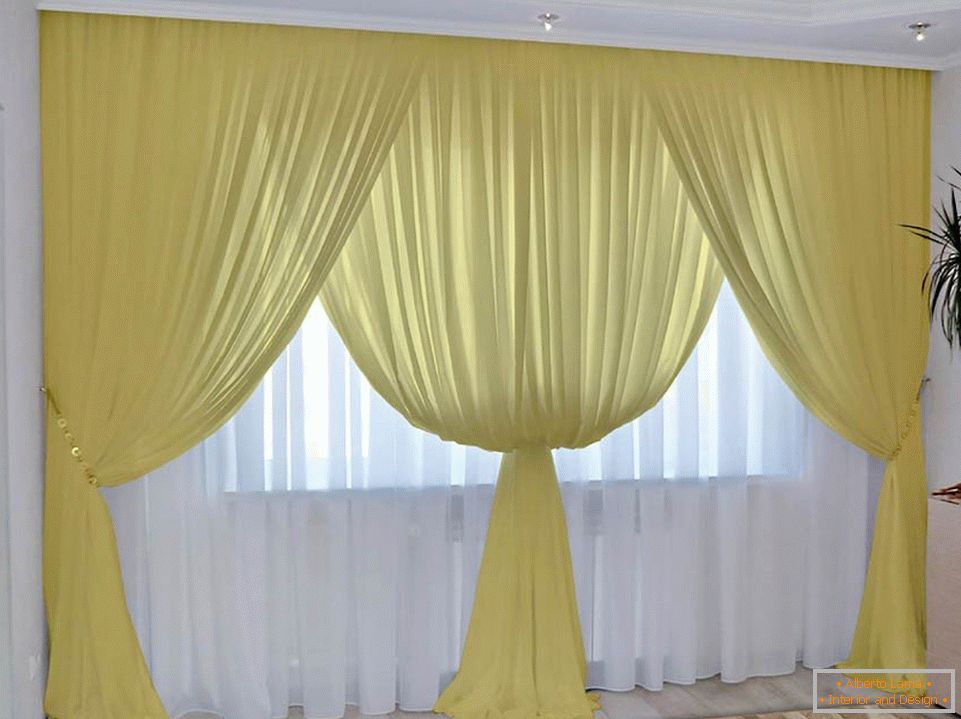
Monochrome and motley curtains
A plain semitransparent tulle on the windows can be considered a standard and an indicator of the good taste of the owners of the apartment. It is suitable both for luxurious interiors and for the most concise. Curtains with multi-colored patterns look original, but require more careful selection of curtains and furnishings. Most often a combination of white with pastel or bright shades is used. For example, tender pink or red flowers on a snow-white background.
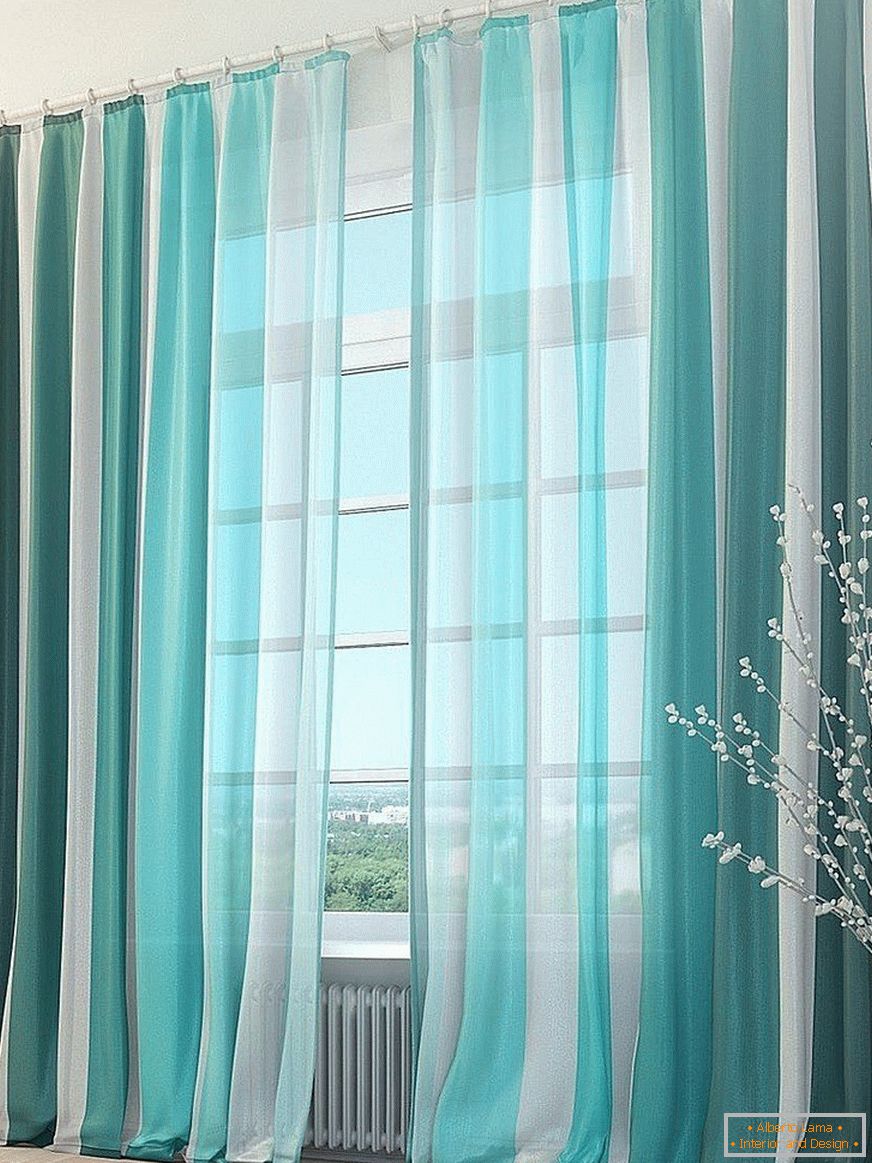
If the tulle is decorated with patterns in any color, it is desirable that this shade is repeated in the color of the wallpaper, upholstery of the sofa or puff, napkins on the table or carpet on the floor. An exception is only the children's room, where a wide variety of tones is permissible. A classic combination and a win-win option for almost any interior will be a white curtain with a fine ornament of dark color, for example blue, brown, bard, and gray. It looks good and a combination of several pastel shades.
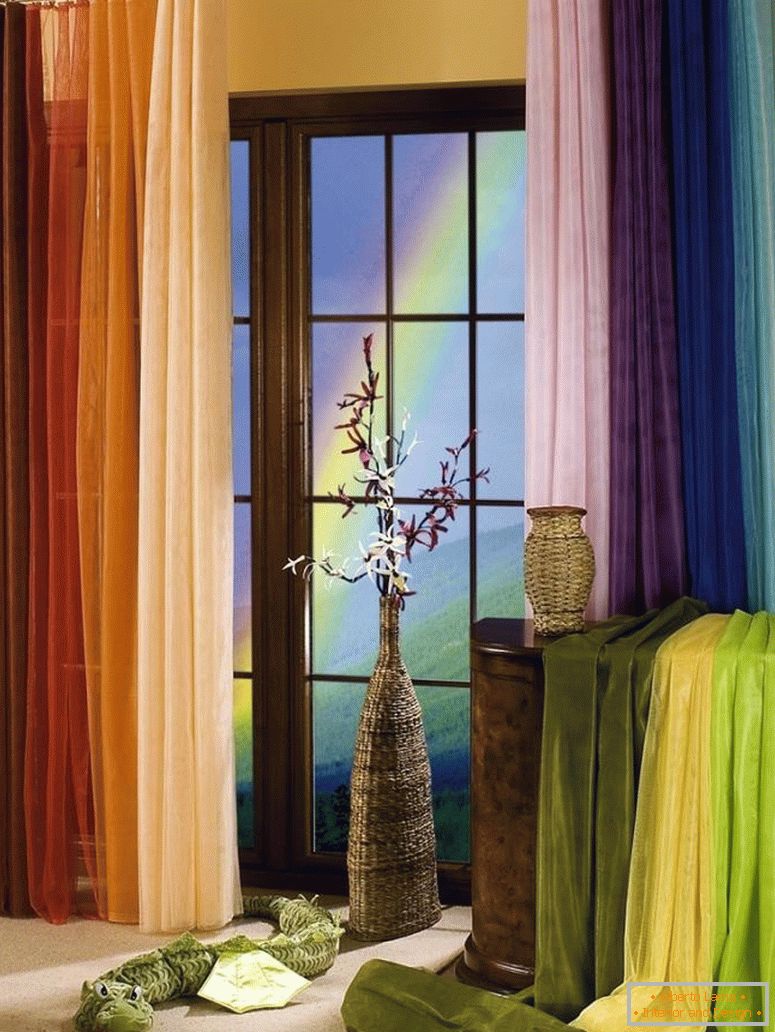
Size and illumination of the room
Volumetric tulle with embroidery, lace, ruffles, printed pattern look great in spacious rooms. This is a good choice for large enough rooms, bedrooms and living rooms. In close rooms with an abundance of furniture, such curtains are inappropriate, they will create a sense of litter, they will look a bit lame. A large ornament or openwork parts will especially adorn the tulle, located on the window, which faces the south side. From too bright sun rays, a dark-colored curtain will protect - gray, blue, purple. To give preference in this case you need cold shades. For small or poorly lit rooms, the best choice will be a light transparent tulle, monochrome or decorated with a small pattern, a thin lace in the center or on the bottom. It should be combined with light curtains. For those facing the north side of the windows, it is better to choose light curtains of warm shades, for example peach, orange, pink. They compensate for the lack of light and create the effect of sunlight penetrating the window.
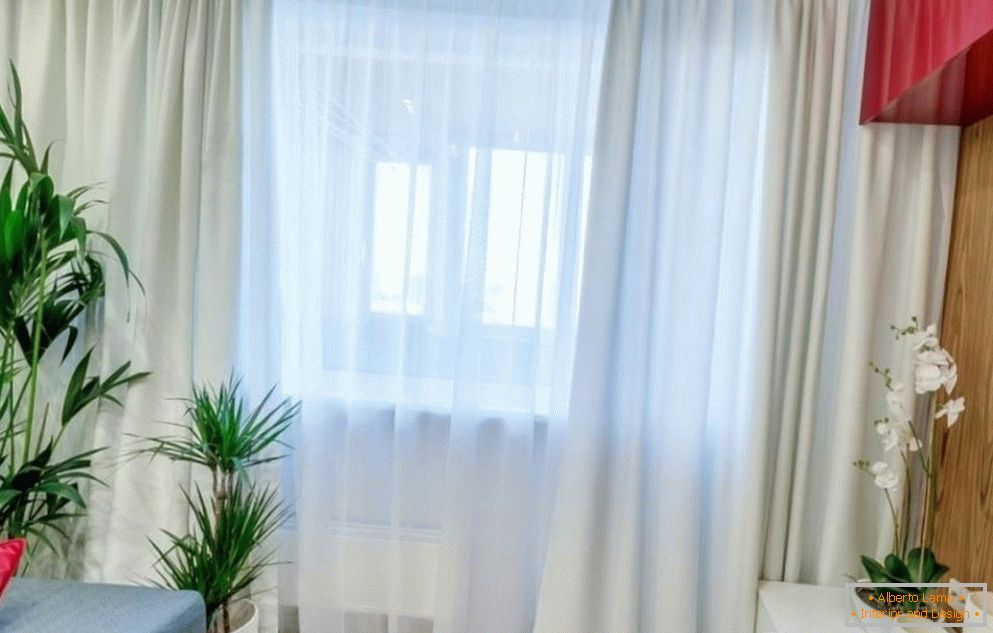
The combination of curtains with the style of the interior of the room
In order to make the room look harmonious, it made a good impression, tulle should be combined with curtains, furniture and carpets. Transparent monophonic curtains, both white and bright, will decorate the room in the style of minimalism, modern or industrial. They are combined with light or dark curtains, laconic modern furniture, lamps and vases of glass, metal and plastic.
Lush, multi-layered tulle will perfectly fit into the style of Provence, Empire, Baroque, and also classic. It successfully complements large sofas, wooden furniture, vases with flowers and curtains with draperies. Fabrics with metallic luster or threads of different colors are suitable for interior design in the style of avant-garde and high-tech. Such curtains are combined with the situation of the room in bright or restrained tones. An interesting solution can be the same design of curtains and any other piece of furniture. For example, a similar embroidery on curtains and cushions.
See also: Design curtains for the kitchen - 80 modern options 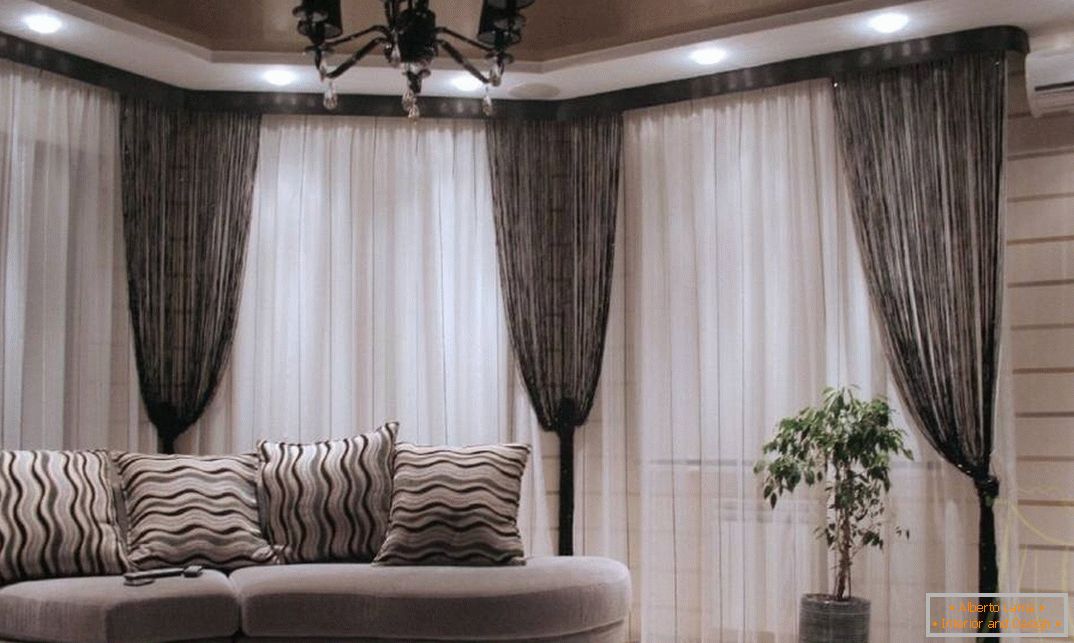
For the living room
Correctly matched tulle in the living room is especially important. It performs the role of an accentuating color accent, or acts as a background, emphasizing the general style of the room. A win-win option would be a single-color pastel shade material. Bright curtains with catchy print require an impeccable sense of proportion in the design of the living room.
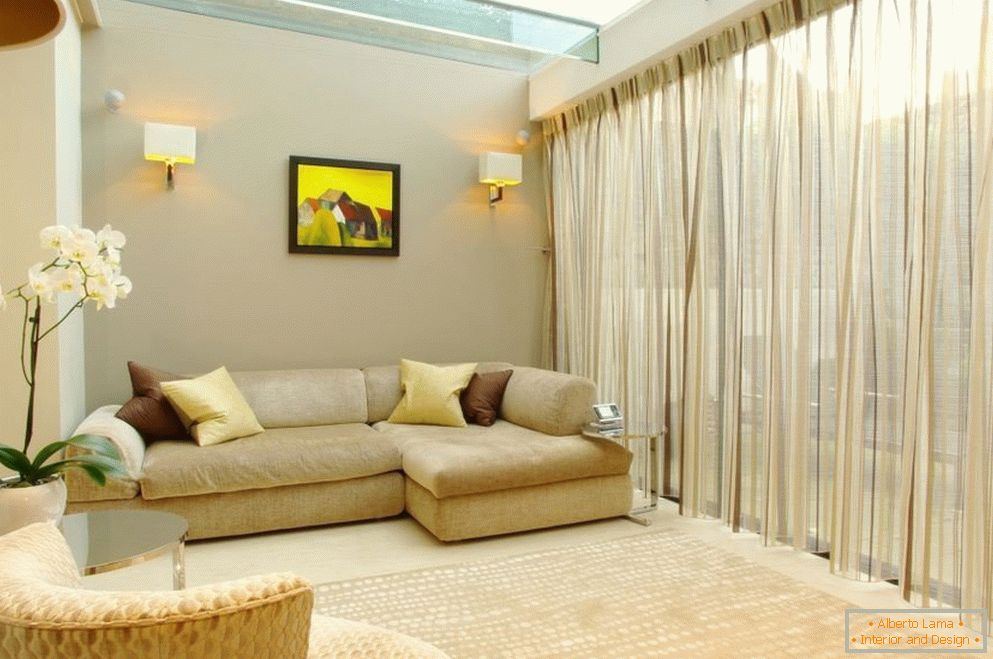
Tulle and curtains in the hall should be made in one shade or make up a contrast. In this case, the color of the curtains, in most cases, is darker. If they are decorated with a pattern, then the curtains should be monophonic. Laconic portieres allow embroidery, lace or large, exquisite ornament on the tulle. In the hall you can use curtains with a noble silvery or golden shine, complex drapery, images in several colors.
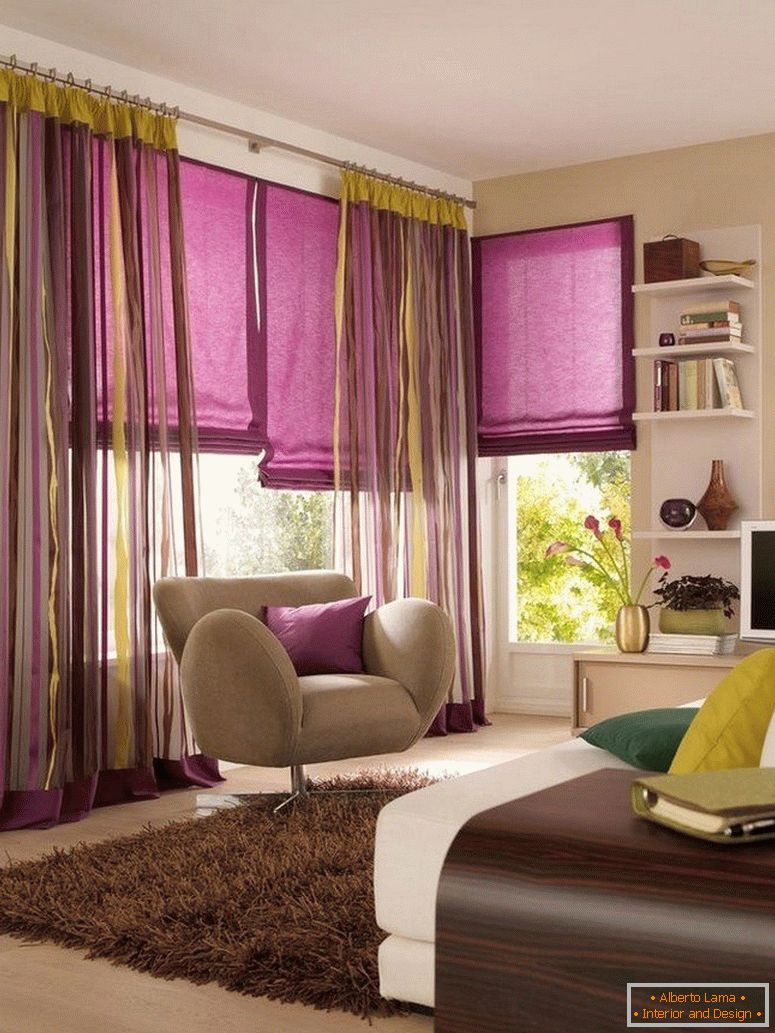
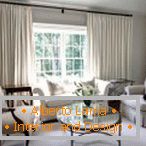
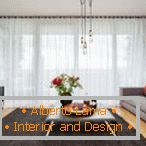
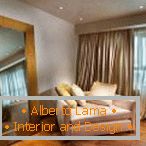
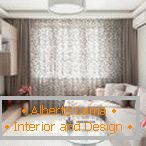

For a bedroom
For a bedroom традиционно выбирают тюль пастельного или приглушенного оттенка. Это способствует расслаблению и полноценному отдыху. Плотные ткани используются при необходимости дополнительной защиты от солнечных лучей. Их часто выбирают и владельцы квартир на нижних этажах. Если комната не слишком ярко освещена можно подобрать кружевной или прозрачный тюль. Более нарядной любую спальню сделает тюль со вставками из гипюра. Уют обеспечит изящное кружево, а также цветочный, геометрический или растительный орнамент, однотонный или же цветной. Если позволяет стиль интерьера спальни, можно использовать занавески с этническими узорами и блестящими нитями, комбинируя их со шторами насыщенных расцветок — ультрамариновой, оранжевой, красной. Стильно выглядит сочетание штор и тюля с одинаковым орнаментом.
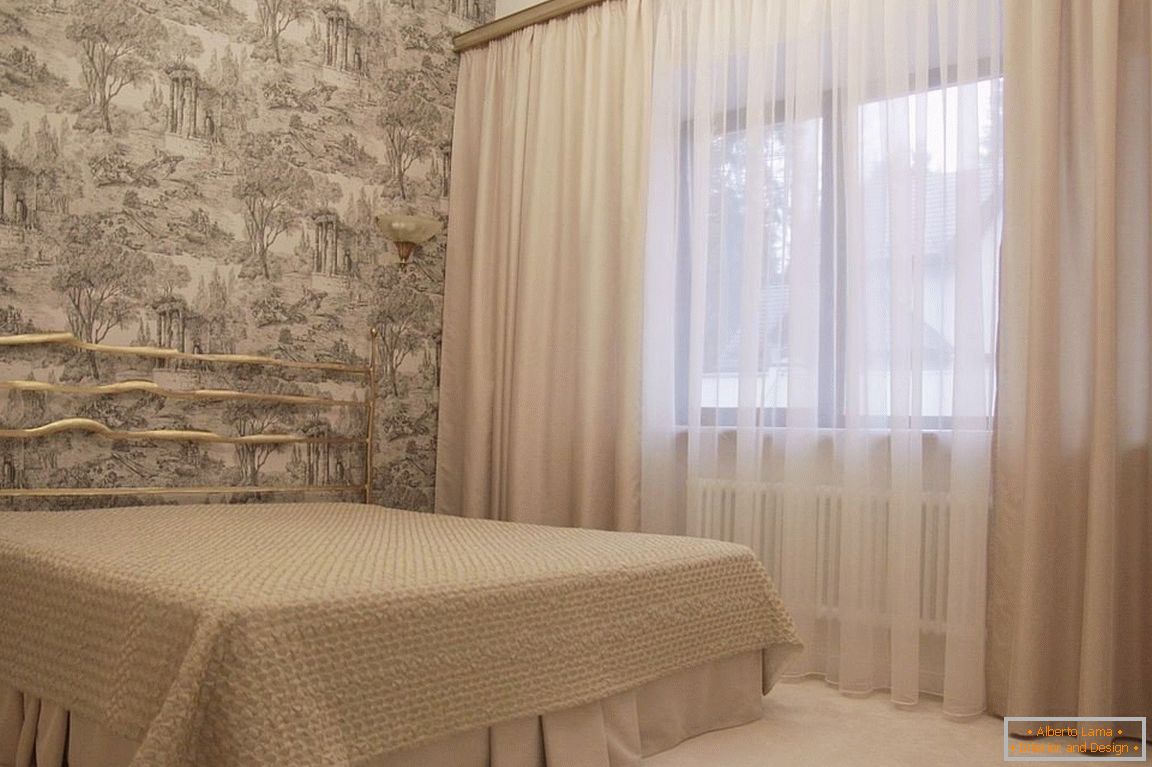
It is important to maintain a single color scheme when choosing curtains, curtains and bedspreads in the bedroom.
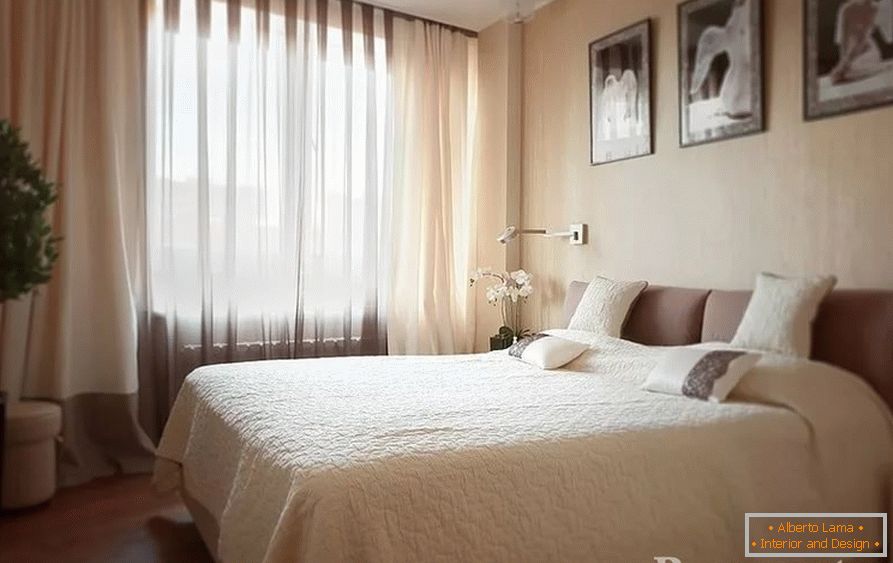
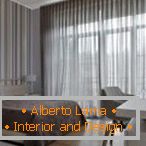

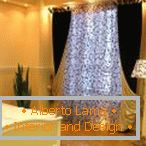
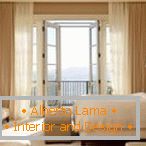

For children
Tulle for a children's room should be, first of all, practical, there is unnecessary complicated drapery, ruches, fine embroidery, any three-dimensional details. In the room of preschool children, it makes sense to hang short curtains, which it will be difficult for curious kids to break or spoil. The colors of the curtains for the children are predominantly bright. This is the case when red, yellow, purple, green, turquoise, raspberry tulle are appropriate. An interesting solution will be curtains made of the same material as the canopy over the baby's bed.
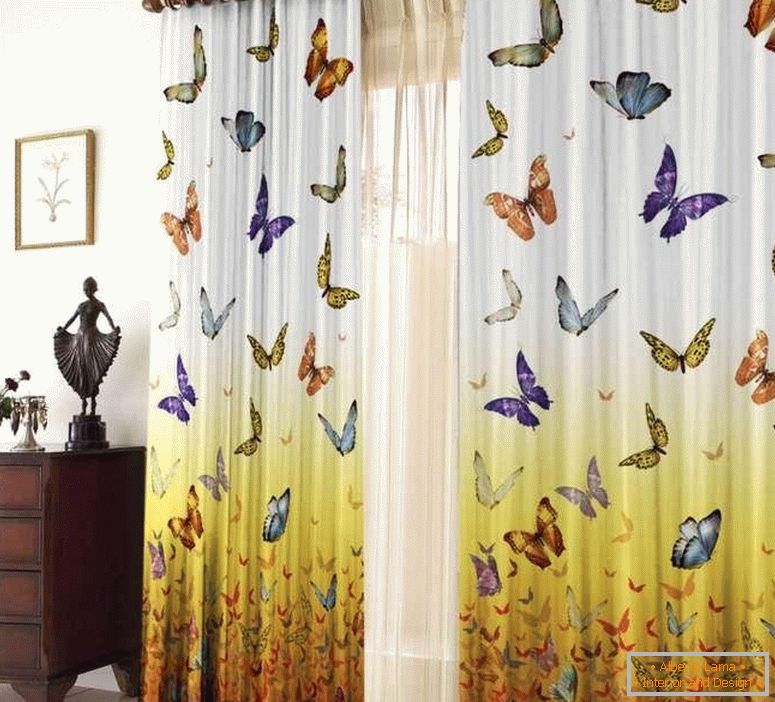
Especially popular among children is tulle with photo printing. Few of the younger members of the family will abandon the original curtains depicting the characters of your favorite cartoon, fairy-tale cities or mysterious landscapes. Such an unusual solution in the interior will contribute to the development of the child's imagination and will lift his mood, help him feel particularly comfortable in his room. You can also use any bright prints, from cars to fruits, flowers or dwellers of the underwater world.
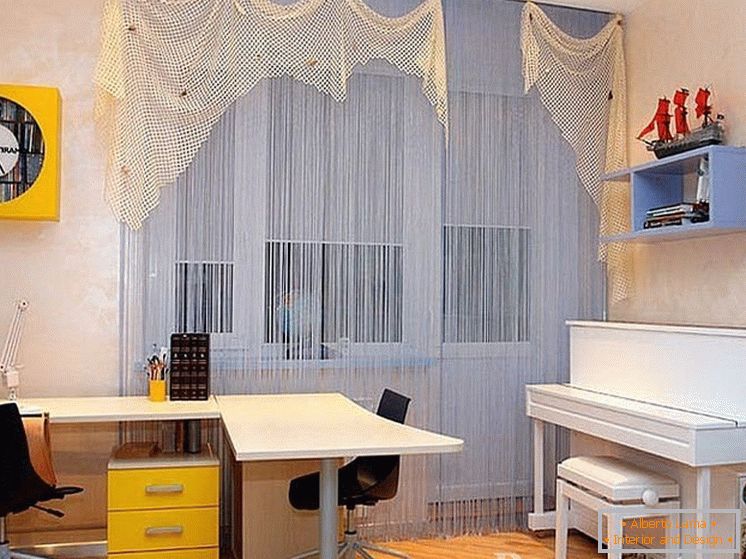
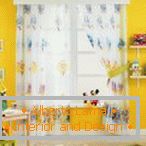

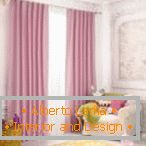
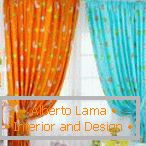
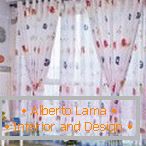
Kitchen
In the kitchen, as nowhere, there are actual short curtains on the windows, up to the window sill or a little lower. They are conveniently removed, washed and hung back, they dry quickly and do not require careful care. Since tulle in the kitchen gets dirty faster than in other rooms, it is worth giving preference to practical synthetic materials. In the design of these products inappropriate lace, embroidery and relief ornament. Their shade should be combined with the color of the walls and furniture, can repeat the coloring of some details - vases, pots with flowers, wall clocks, shelves for spices.
See also: Design curtains for the bedroom - this year's novelties 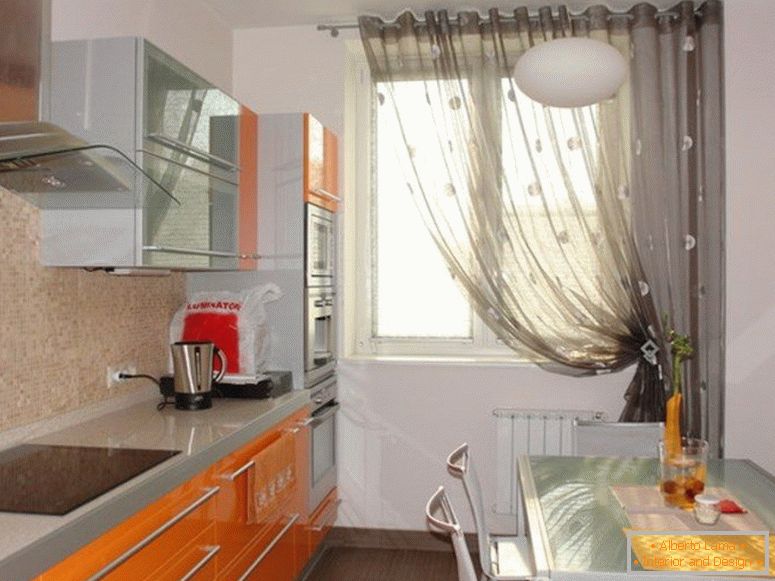
Large drawings should be avoided, they will attract unnecessary attention during everyday business and provoke fatigue. It is best to choose a medium floral or geometric ornament, strip or peas. Shades of kitchen curtains are often warm, it contributes to a good mood and increases appetite. When cooking, lighting plays a big role, so you should give preference to light, transparent materials.
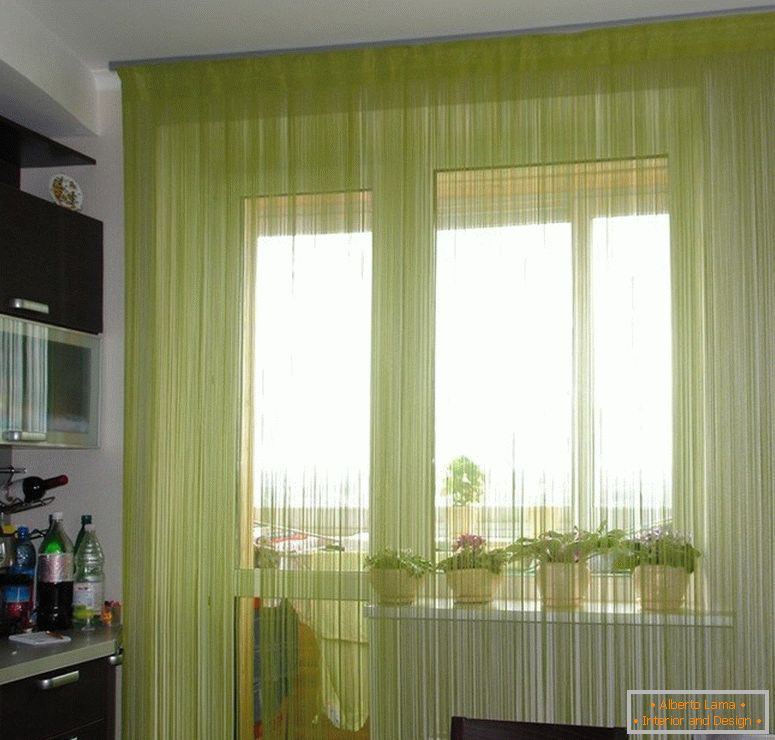
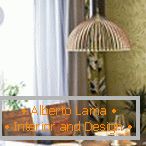
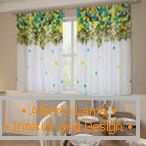
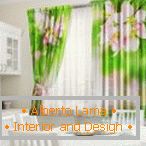
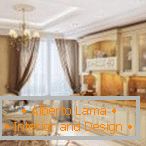
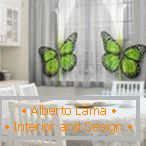
Types of draperies
For effective drapery of curtains, different methods are used, for example:
- laying "bow folds";
- "Roman curtains";
- "The French network";
- Rebma.
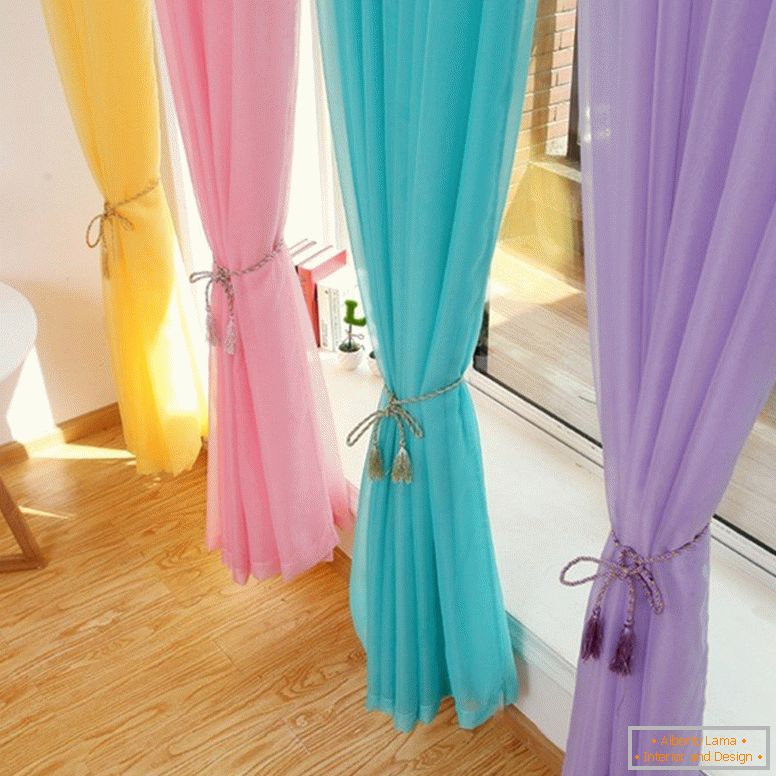
At a way of packing "bow folds" the tulle is collected by small folds, similar to bows. The material fixes the stitch at the top of the curtain. Drapery "Roman curtains" is that along the tulle is a cord. With its help, the fabric is attached and forms beautifully flowing folds of a semicircular shape.
When draping a "French braid" the curtain is neatly spread over the entire length at regular intervals. The marked parts of the tissue are added by a kind of fan and once again they are wasted. This method requires a fairly dense tissue. Lambrequin is a decorative element of tulle drapery, located horizontally in its upper part. It is a fabric strip covering the cornice. Often decorated with ribbons, brushes or ruches.
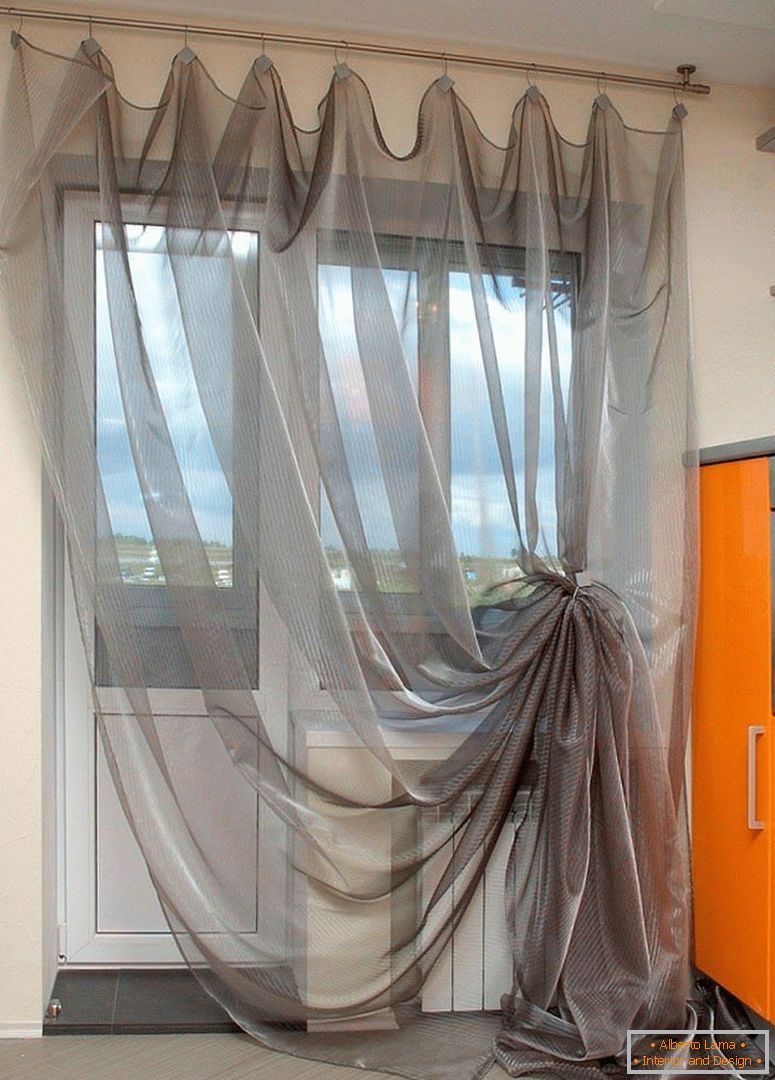
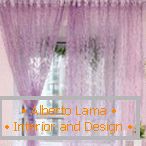
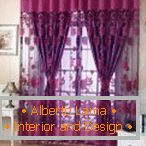

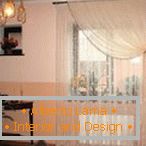
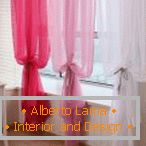
On the laver
Eyelets are often used to create an original, modern design in Art Nouveau, techno or hi-tech style. They are also used in interiors that correspond to the classical style, country, baroque. These rings, located in the upper part of the tulle and fastened around the cornice holes, make it possible to achieve the effect of a beautiful wave on the fabric. In addition, the tulle on the eyelets easily slides over the cornice. You can freely move it, opening and closing the window and not be afraid to damage the thin fabric. The eyelets can be made of metal, plastic, wood or other durable materials. If used, tulle should be wide enough. After a small amount of tissue will not allow you to create a beautiful drapery. The material is suitable both thin and dense, with an invoice pattern. Thanks to the use of transparent or translucent fabrics, folds look bulky, interestingly refract sunlight. Tulle on the eyelets can be used in the interior of any premises.
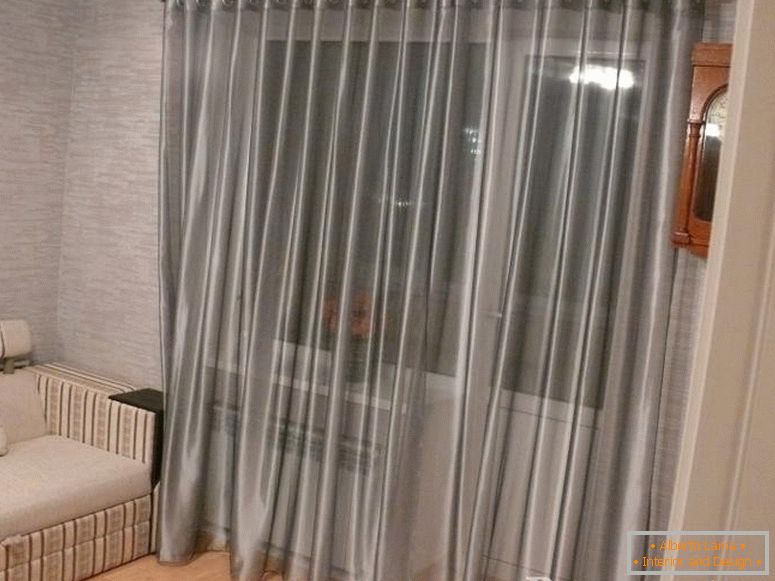
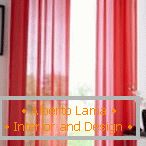
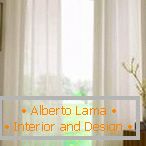
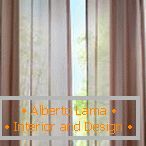

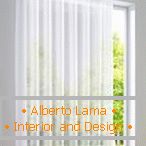
Do I need to combine with the curtains
Curtains can be combined with curtains or used as an independent decor element. Every owner of an apartment or house makes this choice based on his preferences. In addition, when making a decision it is necessary to take into account:
- the size of the room;
- illumination;
- design features.
Often the small size of the room does not allow the tulle and curtains to be placed in the room. This will visually make it even smaller. In this case, it is better to choose a curtain made of organza or veil. Thanks to lace or a large pattern, it will look like an independent element of the decor. Prefer the curtain and if the bedroom or living room windows are closed from bright light by trees or other buildings. Then the curtains will make the room completely dark and uncomfortable. Sometimes the use of tulle is provided for in the interior of the room. The room can be decorated in a minimalist style or vice versa, without the need for additional details due to the abundance of stylish and original furniture, walls or carpets of bright colors.

